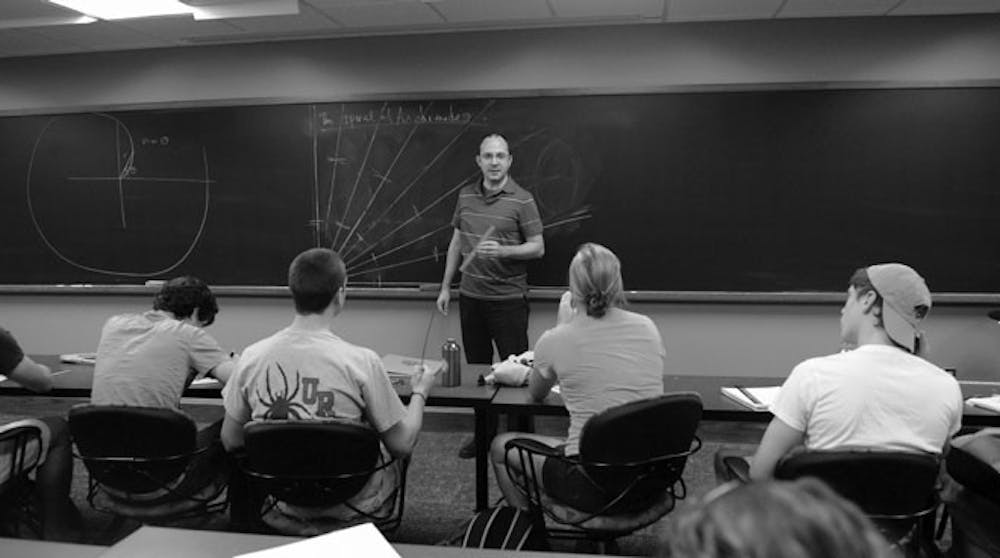Freshmen entering the University of Richmond this fall were not mandated to take a Core class for the first time in 20 years.
Instead, a new program gave incoming freshmen the opportunity to choose from more than 40 different first-year seminars, one-semester courses with topics spanning nearly every discipline at Richmond.
The decision to remove Core occurred nearly two years ago, during the 2008-09 academic year, but some Richmond students were discontent with the course long before then.
"My Core experience was overwhelmingly bad," said senior Alex Vasiloff, who took Core three years ago. "I didn't enjoy it, and didn't know anyone else in the class that did."
Vasiloff was aware of Core's goal, which was to create a shared freshman experience, but he said it didn't work that way.
"The only shared experience we had was complaining about it to each other before class," he said.
The biggest grievance of Vasiloff and his friends was the huge disparity of workload between Core classes.
"If your teacher was lenient, Core would be fun," Vasiloff said. "But my friend had an accounting teacher that was really strict and he received two Cs. That's no way to start as a freshman."
Elisabeth Gruner, associate professor of English and WGSS coordinator, was the chairwoman of the committee that decided to eliminate Core and institute first-year seminars. She also taught Core several times during her 17 years at Richmond.
"The committee wanted to change Core for several reasons," Gruner said. "We'd been doing it for 20 years and it was time to try something new. It was also hard to involve the entire faculty [in Core]. ... Faculty from every school didn't teach it, both because it wasn't their area of expertise and also just scheduling was very hard."
When it came time to vote, Gruner's committee had three options: It could keep Core but make alterations to it, it could continue to have one semester of a common experience but add one semester of a seminar or it could establish two semesters of seminars. The committee chose the two-seminar system.
"People wanted something more flexible so we could see more buy-in from faculty all over campus," Gruner said.
Enjoy what you're reading?
Signup for our newsletter
An example of a seminar available this year that would have fallen outside the scope of Core's curriculum is "The Nature of Mathematics."
Professor William Ross said he wouldn't have been comfortable teaching a Core class, but he was comfortable teaching his seminar.
"While I am interested in some of those great [Core] books, I felt I wasn't accomplished at them," Ross said. "But I am accomplished at mathematics. Do I know all of the topics I'm doing perfectly? Certainly not, but I feel I have the skills to be able to quickly learn Archimedes, or stuff like that."
While Ross said students needed no more than basic high school math skills to take his class, he has found that all of his students had taken at the very minimum first-and-second level calculus classes in high school.
"[The Nature of Mathematics] was the only seminar on the list that caught my eye," said freshman Vivian Hsieh, a student in Ross' class.
Hsieh, who has always liked math, said taking a first-year seminar in math had reaffirmed her strong interest in the subject at the college level.
Another of Ross' freshman students, Taylor Blazer, is considering being a math major. She has really enjoyed the energy Ross has brought to his lectures.
"[In the past] he's been teaching strictly calculus classes," Blazer said. "It seems like he really enjoys getting out of that zone and getting more into the history of math."
Although students in the course find themselves mostly doing mathematical proofs, there is still a large writing component to the class. Students are expected to submit about 5,000 words, or 20 pages, of writing as part of first-year seminar guidelines.
Brian Henry, associate professor of creative writing, is teaching a seminar called "The Post-Apocalyptic Imagination," which has a structure very much like a Core class.
Henry said the biggest difference between first-year seminars and Core was Core's set syllabus.
"Eight out of the nine texts were standard in Core," Henry said.
Henry had the ability to design his own syllabus for his first-year seminar, but he said the ultimate aim was the same -- helping students with their reading, writing and critical thinking.
"The advantage is that each faculty member can teach according to his or her passions or interests," Henry said.
Tyler Morgan, one of Henry's students, said that students were more compelled to feel good about their seminar because they had chosen it.
"[Henry's class] is the homework I do for a break," Morgan said.
Another student in the class, freshman Justin Bader, said he liked his first-year seminar more than he would have a Core class because it made the learning more personal.
"When I was signing up for classes I read the name "Post-Apocalyptic Imagination," and I thought, 'I've read a bunch of books like that,'" he said. "I went for it because it looked fun."
Even though Bader's interests are more in business than English, he has enjoyed the deep philosophical discussion about what will happen to life after an apocalypse.
"Each book has its hope for survival," he said. "There's always a warning to everything that's written, so it makes you question our current society and the direction it's moving."
Contact staff writer Zak Kozuchowski at zak.kozuchowski@richmond.edu
Support independent student media
You can make a tax-deductible donation by clicking the button below, which takes you to our secure PayPal account. The page is set up to receive contributions in whatever amount you designate. We look forward to using the money we raise to further our mission of providing honest and accurate information to students, faculty, staff, alumni and others in the general public.
Donate Now



